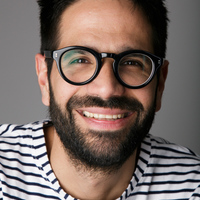March 10, 2016, 3:30-5:30 — Osgoode Hall Law School (Ignat Kaneff Building), Room 2027
For the final seminar of the 2015/2016 academic year, the ILIGS was joined by Luis Eslava, Lecturer in Law at University of Kent Law School, with a presentation entitled “The Moving Location of Empire: History, Anthropology and the Living Archive of International Law”. Borrowing insights from critical historiography and the anthropology of international law, Luis’s seminar engaged with the longstanding relation between international law and imperialism. With reference to late colonial footage produced by the Bantu Education Kinema, Luis explored the dynamism and implications of late imperialism, both past and present. As usual, the discussion (led by Osgoode Professor Ruth Buchanan) saw a fruitful exchange of ideas from those in attendance, to close off a positive inaugural year for the ILIGS.

Luis Eslava works in the areas of International Law, International Legal Theory and History, Anthropology of International Law, Public Law, Law and Development, Theory of Property, and Urban Law and Politics at the University of Kent, Kent Law School. His research focuses on the relationship between international and domestic legal orders, and the effects of this relationship both on our jurisprudential understanding of these areas of law, and on the constitution of everyday life in today’s global order. In recent years, Luis has been particularly interested in the increasing impact of local jurisdictions (e.g. cities and municipalities) on the international scene. His work in this area interrogates the rationale and contradictions that have accompanied this trend, using different locations in the Global South as case studies.
Abstract: Borrowing insights from critical historiography and the anthropology of international law, I engage in this presentation with the longstanding relation between International Law and imperialism, using late colonial footage produced by the Bantu Education Kinema Experiment as the departing point for my analysis. Between 1935 and 1937, the International Missionary Council conducted the Bantu Experiment, in coordination with the colonial governments of the British protectorates and mandates in Tanganyika (today Tanzania), Kenya, Uganda, Northern Rhodesia and Nyasaland (currently Zambia and Malawi). The objective of the Bantu Experiment was the production of educational films to be screened to ‘native’ people by mobile cinemas. The films used local actors, and their tone was overtly pedagogical. Plots were intentionally formulaic, striving to capture ‘the native point of view’. Thirty-five films were produced in total during the two years of the project. Today, only three of these films survive. As I will argue, the Bantu Experiment helps us understand the dynamism of late imperialism, as it played out at one of the most important moments in the formation of a modern international legal order under the League of Nations, and as it continues to inform our present global relations.
 ork University.
ork University. ion resulted in a failure to challenge the axes of intra- and inter-state power that continues to operate within international criminal law.
ion resulted in a failure to challenge the axes of intra- and inter-state power that continues to operate within international criminal law. destruction in international criminal law, drawing on TWAIL scholarship and illustrative examples from recent films (The Monuments Men & Timbuktu). This seminar also had a positive turnout from members of the Osgoode community. The discussion period, led by PhD candidate Angus Grant, lasted for over an hour, with almost all participants sharing their views on the nexus between culture, property and law from a Global South perspective.
destruction in international criminal law, drawing on TWAIL scholarship and illustrative examples from recent films (The Monuments Men & Timbuktu). This seminar also had a positive turnout from members of the Osgoode community. The discussion period, led by PhD candidate Angus Grant, lasted for over an hour, with almost all participants sharing their views on the nexus between culture, property and law from a Global South perspective.